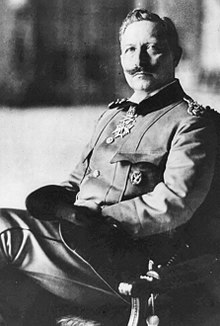
Back Burgfriedenspolitik Catalan Burgfriedenspolitik German Burgfriedenspolitik Spanish Burgfrieden French Burgfrieden Italian 城内平和 Japanese 성내평화정치 Korean Burgfriedenspolitik NB Burgfrieden Portuguese 城堡和平 Chinese

Burgfriedenspolitik (German: [ˈbʊʁkfʁiːdn̩s.poliˌtiːk], lit. 'castle peace policy') was a political truce between the German Empire's parliamentary parties during World War I. They agreed not to criticise the government's handling of the war, to keep their disagreements out of public view and to postpone elections until after the end of the war. In addition, three major associations of trade unions promised not to strike.[1] The informal agreement was seen as proof of Germany's national unity in waging what was presented by the imperial leadership as a defensive war.
Even though the Social Democratic Party of Germany (SPD) had adopted the Second International's policy of anti-militarism, it joined the rest of the Reichstag in supporting the declaration of war in the belief that Germany was defending itself against the Russian Empire. Emperor Wilhelm II and the other parliamentary parties enthusiastically welcomed the SPD's unanimous vote in favor of war credits on 4 August 1914.[2] The vote marked the start of the Burgfrieden.
The political truce was relatively short-lived. By mid-1915, discussions about the war began to center around what were often annexationist war goals. The Right saw the Burgfrieden as a sign of support for the authoritarian state while the Left expected their sacrifices to be rewarded by social changes after the end of the war. Disagreements within the SPD led to a permanent split within the party when anti-war members formed their own more leftist party, the Independent Social Democrats (USPD), in 1917.[3]
The term Burgfrieden came into use more or less spontaneously. The situation in 1914 was seen to mirror the internal peace that by necessity prevailed inside a besieged castle during the Middle Ages.[4]
- ^ "Gewerkschaften und SPD. Einheitsfront für den Krieg" [Trade unions and SPD. United front for the war]. Geschichte der Gerwerkschaften (in German).
- ^ Cite error: The named reference
:1was invoked but never defined (see the help page). - ^ Cite error: The named reference
:4was invoked but never defined (see the help page). - ^ Cite error: The named reference
:0was invoked but never defined (see the help page).